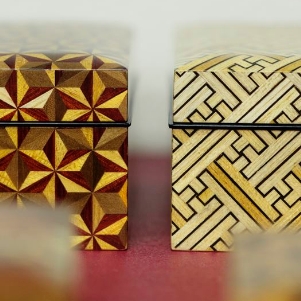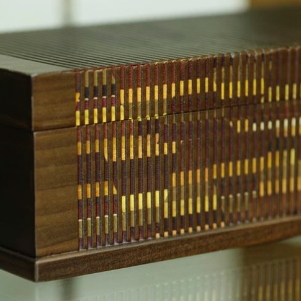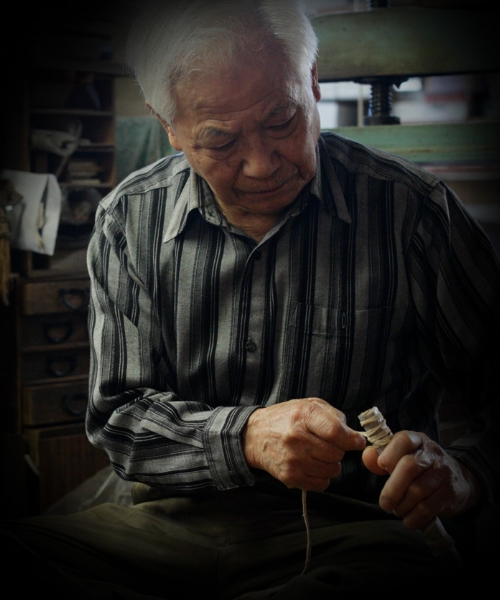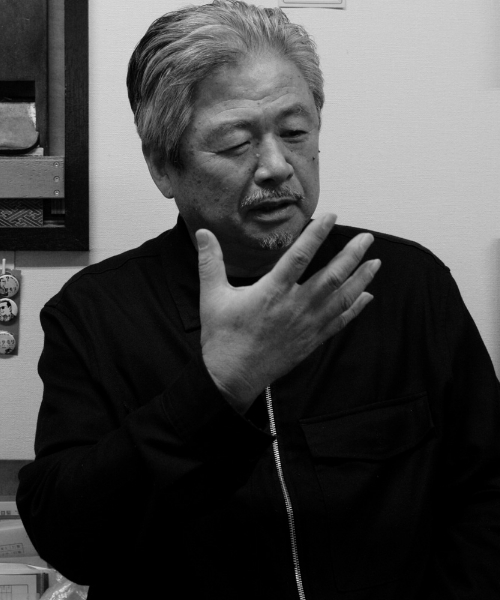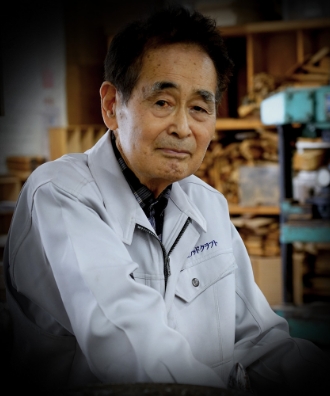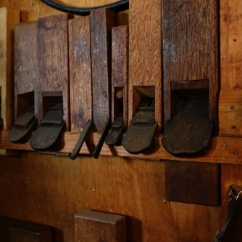
The Passion

Noboru
traditional craftsman.
At the age of 16, he began working with his father, Wataru, in the world of Hakone-Yosegi-Zaiku. He is now 90 years old (as of 2022). But his mind is sharp, and he can talk about old events from the year to the month as if it were yesterday. And his legs are so strong that it is hard to believe he is 90 years old.
Even on the stairs to the Honma Yosegi Museum on the second floor of the store, he is so light on his feet, as if he were climbing up one flight of stairs, that I think he may be faking his age. (laughs)
He says that his activities as a traditional craftsman can be roughly divided into two categories: "training successors" and "developing demand (sales channels)." Mr. Honma felt proud to be certified as a traditional craftsman in recognition of his own technical skills, but also felt the weight of responsibility."

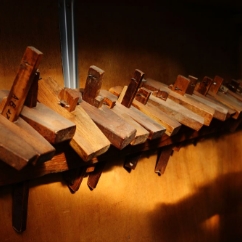
"What we are making is not art work, it's a product."
"I think that it is crucial to develop sales channels and sell our products, not artworks. But also important to train successors. I believe that when the products are sold, successors are nurtured. So, I went all over Japan as well as the world to sell my products."
Before and after he was certified as a Japanese traditional craftsman in 1986, he rushed to the scene for appeal. At that time, he sometimes had to pay for all his travel and accommodation expenses overseas.
"I'm a craftsman, not an artist. I think that's why it's essential to expand sales channels to come up with products that are easy to buy by appealing to the aesthetics and demand of customers who value and appreciate these works."
Mr. Honma seemed to be an artist rather than a craftsman. He Boyish-Smiled and said, "No, no, I've always been a craftsman, and I'm proud to be one.
With the passage of the Law for the Promotion of Traditional Craft Industries on May 25, 1974, traditional crafts began to be reviewed in Japan.
Ten years later, in 1984, Hakone-Yosegi-Zaiku was designated as Japanese traditional crafts. Although it was a never easy road, Mr. Honma encountered a piece of work that "changed my life" in this process.
For being certified as Japanese traditional crafts, it requires that Yosegi-Zaiku has been handed down since the Edo period, and I never doubt it. But I didn't have the actual product.
So, I looked for it in every way. And one day, an ordinary person brought in an old Yosegi-Zaiku to me. I had the experts check it out, and it was an absolutely one from the Edo period.
After many twists and turns, Hakone-Yosegi-Zaiku was certified as Japanese traditional crafts.
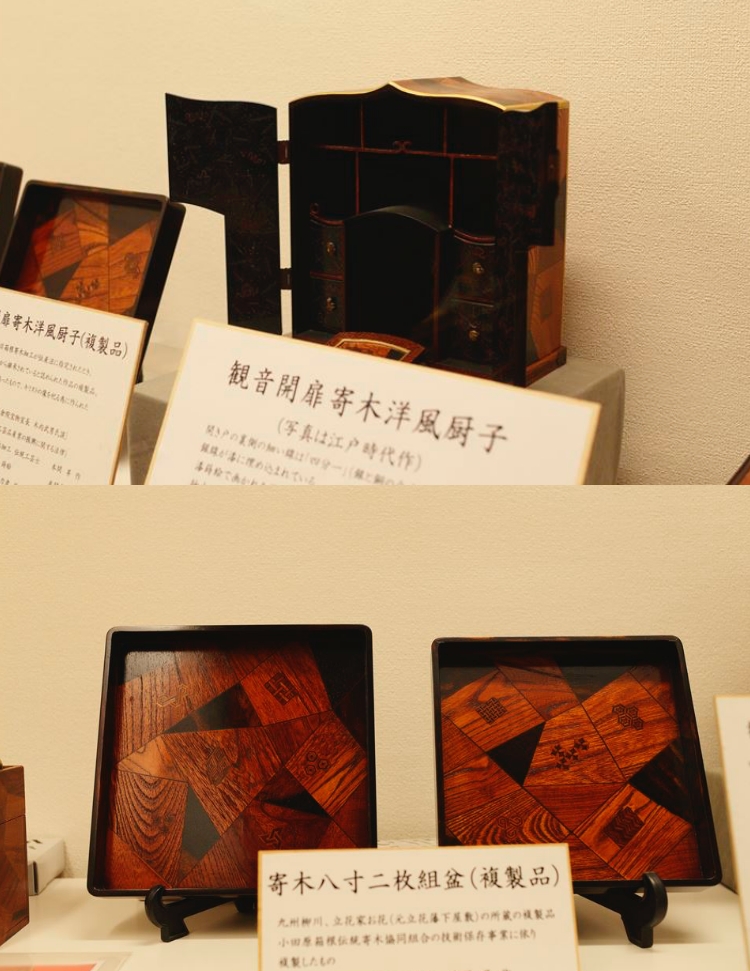
When Mr. Honma saw this Yosegi-Zaiku, he couldn't hide his surprise and decided to make a replica of this Yosegi-Zaiku with his own hands, which took three years to complete. He was so shocked that he said, "This reproduction changed my life," and as part of the project to preserve the technique, he decided to make a full-scale reproduction.
As part of the project to preserve the technique, Mr. Honma started to make reproductions in earnest. This was one of the reasons that led him to discover and study Yosegi-Zaiku items from the Edo period (1603-1867), including stacked boxes, trays, paper boxes, and travel pillows.
"I was even able to get my hands on some of them, including a Yosegi-Zaiku two-piece tray that would have been used by a lord, with the word "Yosegi-Zaiku" clearly written on it."
"Making reproductions of original Yosegi-Zaiku changed my life dramatically."
"Learning about old designs and techniques has had a profound influence on my own designs since then," he said. One such work is called "Kodai-Gire (Ancient Sack) Yosegi Pattern, devised by Mr. Honma. Inspired by an ancient cloth from the Momoyama period (1592-1602), he named it "Kodai-Gire."
Although it is a random marquetry pattern, Mr. Honma's motivation to create is still evident. And new designs are being created one by one.
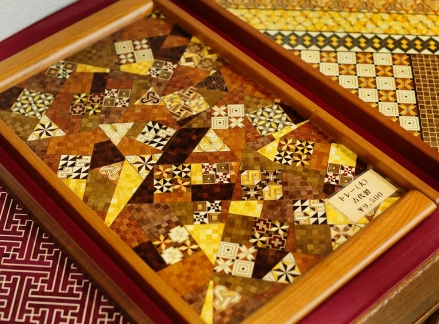
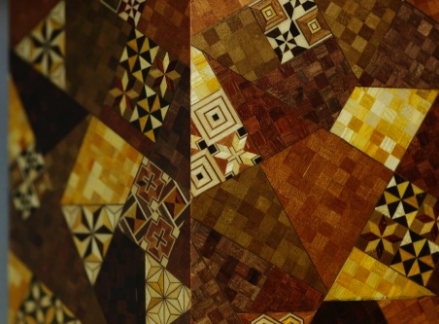
in the workshop from eight o'clock.
At the age of 90, he can still say, "I'm still learning to come up with new designs. I enjoy working, I enjoy making things, and I still work in the workshop with the craftsmen from 8:00 to 17:30."
"I feel like I'm constantly watching and learning something. Ever since I was young, when I went to department stores, I would look at kimono patterns, obi belts and just see all kinds of patterns and designs."
It's overwhelming. I thought I enjoyed my job a lot, but it was a different level from Mr. Honma's. It was the first time I was so moved during the interview that I couldn't help but cry.
MOVIE

